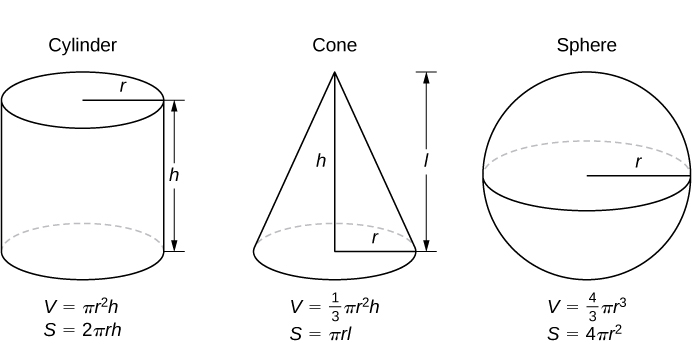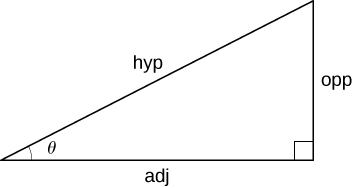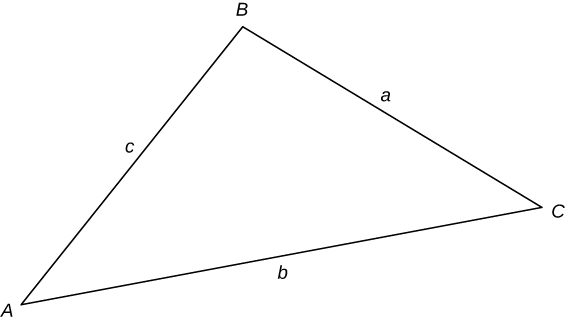Review of Pre-Calculus
Formulas from Geometry
 Area,
Area,  Volume, and
Volume, and  Lateral Surface Area
Lateral Surface Area


Formulas from Algebra
Laws of Exponents
![Rendered by QuickLaTeX.com \begin{array}{ccccccccccccc}\hfill {x}^{m}{x}^{n}& =\hfill & {x}^{m+n}\hfill & & & \hfill \dfrac{{x}^{m}}{{x}^{n}}& =\hfill & {x}^{m-n}\hfill & & & \hfill {\left({x}^{m}\right)}^{n}& =\hfill & {x}^{mn}\hfill \\[3mm] \hfill {x}^{-n}& =\hfill & \dfrac{1}{{x}^{n}}\hfill & & & \hfill {\left(xy\right)}^{n}& =\hfill & {x}^{n}{y}^{n}\hfill & & & \hfill {\left(\dfrac{x}{y}\right)}^{n}& =\hfill & \dfrac{{x}^{n}}{{y}^{n}}\hfill \\[3mm] \hfill {x}^{1\text{/}n}& =\hfill & \sqrt[n]{x}\hfill & & & \hfill \sqrt[n]{xy}& =\hfill & \sqrt[n]{x}\sqrt[n]{y}\hfill & & & \hfill \sqrt[n]{\dfrac{x}{y}}& =\hfill & \dfrac{\sqrt[n]{x}}{\sqrt[n]{y}}\hfill \\[3mm] \hfill {x}^{m\text{/}n}& =\hfill & \sqrt[n]{{x}^{m}}={\left(\sqrt[n]{x}\right)}^{m}\hfill & & & & & & & & & & \end{array}](https://pressbooks.openedmb.ca/app/uploads/quicklatex/quicklatex.com-74fb291972da97336ff9b4997c50cdb2_l3.png)
Special Factorizations
![Rendered by QuickLaTeX.com \begin{array}{ccc}\hfill {x}^{2}-{y}^{2}& =\hfill & \left(x+y\right)\left(x-y\right)\hfill \\[1mm] \hfill {x}^{3}+{y}^{3}& =\hfill & \left(x+y\right)\left({x}^{2}-xy+{y}^{2}\right)\hfill \\[1mm] \hfill {x}^{3}-{y}^{3}& =\hfill & \left(x-y\right)\left({x}^{2}+xy+{y}^{2}\right)\hfill \end{array}](https://pressbooks.openedmb.ca/app/uploads/quicklatex/quicklatex.com-de48a1ece72bc3b73d408f92e84a9553_l3.png)
Quadratic Formula
If ![]() then
then ![]()
Binomial Theorem
![]()
where ![]()
Formulas from Trigonometry
Right-Angle Trigonometry
![Rendered by QuickLaTeX.com \begin{array}{cccc}\text{sin}\phantom{\rule{0.1em}{0ex}}(\theta) =\dfrac{\text{opp}}{\text{hyp}}\hfill & & & \text{csc}\phantom{\rule{0.1em}{0ex}}(\theta) =\dfrac{\text{hyp}}{\text{opp}}\hfill \\[3mm] \text{cos}\phantom{\rule{0.1em}{0ex}}(\theta) =\dfrac{\text{adj}}{\text{hyp}}\hfill & & & \text{sec}\phantom{\rule{0.1em}{0ex}}(\theta) =\dfrac{\text{hyp}}{\text{adj}}\hfill \\[3mm] \text{tan}\phantom{\rule{0.1em}{0ex}}(\theta) =\dfrac{\text{opp}}{\text{adj}}\hfill & & & \text{cot}\phantom{\rule{0.1em}{0ex}}(\theta) =\dfrac{\text{adj}}{\text{opp}}\hfill \end{array}](https://pressbooks.openedmb.ca/app/uploads/quicklatex/quicklatex.com-6d04c5f9c43a6b64643b87d456a4105f_l3.png)

Trigonometric Functions of Important Angles
| — |
Fundamental Identities
![Rendered by QuickLaTeX.com \begin{array}{cccccccc}\hfill {\text{sin}}^{2}(\theta) +{\text{cos}}^{2}(\theta) & =\hfill & 1\hfill & & & \hfill \text{sin}\left(-\phantom{\rule{0.1em}{0ex}}\theta \right)& =\hfill & -\text{sin}\phantom{\rule{0.1em}{0ex}}(\theta) \hfill \\[1mm] \hfill 1+{\text{tan}}^{2}(\theta) & =\hfill & {\text{sec}}^{2}(\theta) \hfill & & & \hfill \text{cos}\left(-\phantom{\rule{0.1em}{0ex}}\theta \right)& =\hfill & \text{cos}\phantom{\rule{0.1em}{0ex}}(\theta) \hfill \\[1mm] \hfill 1+{\text{cot}}^{2}(\theta) & =\hfill & {\text{csc}}^{2}(\theta) \hfill & & & \hfill \text{tan}\left(-\phantom{\rule{0.1em}{0ex}}\theta \right)& =\hfill & -\text{tan}\phantom{\rule{0.1em}{0ex}}(\theta) \hfill \\[2mm] \hfill \text{sin}\left(\frac{\pi }{2}-\theta \right)& =\hfill & \text{cos}\phantom{\rule{0.1em}{0ex}}(\theta) \hfill & & & \hfill \text{sin}\left(\theta +2\pi \right)& =\hfill & \text{sin}\phantom{\rule{0.1em}{0ex}}(\theta) \hfill \\[2mm] \hfill \text{cos}\left(\frac{\pi }{2}-\theta \right)& =\hfill & \text{sin}\phantom{\rule{0.1em}{0ex}}(\theta) \hfill & & & \hfill \text{cos}\left(\theta +2\pi \right)& =\hfill & \text{cos}\phantom{\rule{0.1em}{0ex}}(\theta) \hfill \\[2mm] \hfill \text{tan}\left(\frac{\pi }{2}-\theta \right)& =\hfill & \text{cot}\phantom{\rule{0.1em}{0ex}}(\theta) \hfill & & & \hfill \text{tan}\left(\theta +\pi \right)& =\hfill & \text{tan}\phantom{\rule{0.1em}{0ex}}(\theta) \hfill \end{array}](https://pressbooks.openedmb.ca/app/uploads/quicklatex/quicklatex.com-bb37ebe66bfa8276c65c33b64546ff38_l3.png)
Law of Sines
![]()

Law of Cosines
![Rendered by QuickLaTeX.com \begin{array}{ccc}\hfill {a}^{2}& =\hfill & {b}^{2}+{c}^{2}-2bc\phantom{\rule{0.2em}{0ex}}\text{cos}\phantom{\rule{0.2em}{0ex}}(A)\hfill \\[1mm] \hfill {b}^{2}& =\hfill & {a}^{2}+{c}^{2}-2ac\phantom{\rule{0.2em}{0ex}}\text{cos}\phantom{\rule{0.2em}{0ex}}(B)\hfill \\[1mm] \hfill {c}^{2}& =\hfill & {a}^{2}+{b}^{2}-2ab\phantom{\rule{0.2em}{0ex}}\text{cos}\phantom{\rule{0.2em}{0ex}}(C)\hfill \end{array}](https://pressbooks.openedmb.ca/app/uploads/quicklatex/quicklatex.com-f505c746d3d86901175964c8f75bc47c_l3.png)
Addition and Subtraction Formulas
![Rendered by QuickLaTeX.com \begin{array}{ccc}\hfill \text{sin}\phantom{\rule{0.2em}{0ex}}\left(x+y\right)& =\hfill & \text{sin}\phantom{\rule{0.2em}{0ex}}(x)\phantom{\rule{0.2em}{0ex}}\text{cos}\phantom{\rule{0.2em}{0ex}}(y)+\text{cos}\phantom{\rule{0.2em}{0ex}}(x)\phantom{\rule{0.2em}{0ex}}\text{sin}\phantom{\rule{0.2em}{0ex}}(y)\hfill \\[1mm] \hfill \text{sin}\phantom{\rule{0.1em}{0ex}}\left(x-y\right)& =\hfill & \text{sin}\phantom{\rule{0.2em}{0ex}}(x)\phantom{\rule{0.2em}{0ex}}\text{cos}\phantom{\rule{0.2em}{0ex}}(y)-\text{cos}\phantom{\rule{0.2em}{0ex}}(x)\phantom{\rule{0.2em}{0ex}}\text{sin}\phantom{\rule{0.2em}{0ex}}(y)\hfill \\[1mm] \hfill \text{cos}\phantom{\rule{0.1em}{0ex}}\left(x+y\right)& =\hfill & \text{cos}\phantom{\rule{0.2em}{0ex}}(x)\phantom{\rule{0.2em}{0ex}}\text{cos}\phantom{\rule{0.2em}{0ex}}(y)-\text{sin}\phantom{\rule{0.2em}{0ex}}(x)\phantom{\rule{0.2em}{0ex}}\text{sin}\phantom{\rule{0.2em}{0ex}}(y)\hfill \\[1mm] \hfill \text{cos}\phantom{\rule{0.1em}{0ex}}\left(x-y\right)& =\hfill & \text{cos}\phantom{\rule{0.2em}{0ex}}(x)\phantom{\rule{0.2em}{0ex}}\text{cos}\phantom{\rule{0.2em}{0ex}}(y)+\text{sin}\phantom{\rule{0.2em}{0ex}}(x)\phantom{\rule{0.2em}{0ex}}\text{sin}\phantom{\rule{0.2em}{0ex}}(y)\hfill \\[2mm] \hfill \text{tan}\phantom{\rule{0.1em}{0ex}}\left(x+y\right)& =\hfill & \dfrac{\text{tan}\phantom{\rule{0.2em}{0ex}}(x)+\text{tan}(y)}{1-\text{tan}\phantom{\rule{0.2em}{0ex}}(x)\phantom{\rule{0.2em}{0ex}}\text{tan}(y)}\hfill \\[3mm] \hfill \text{tan}\left(x-y\right)& =\hfill & \dfrac{\text{tan}\phantom{\rule{0.2em}{0ex}}(x)-\text{tan}(y)}{1+\text{tan}\phantom{\rule{0.2em}{0ex}}(x)\phantom{\rule{0.2em}{0ex}}\text{tan}(y)}\hfill \end{array}](https://pressbooks.openedmb.ca/app/uploads/quicklatex/quicklatex.com-35db26d3af1eee4a490d94e85c71f41f_l3.png)
Double-Angle Formulas
![Rendered by QuickLaTeX.com \begin{array}{ccc}\hfill \text{sin}\phantom{\rule{0.2em}{0ex}}(2x)& =\hfill & 2\phantom{\rule{0.1em}{0ex}}\text{sin}\phantom{\rule{0.2em}{0ex}}(x)\phantom{\rule{0.2em}{0ex}}\text{cos}\phantom{\rule{0.2em}{0ex}}(x)\hfill \\[1mm] \hfill \text{cos}\phantom{\rule{0.2em}{0ex}}(2x)& =\hfill & {\text{cos}}^{2}(x)-{\text{sin}}^{2}(x)=2\phantom{\rule{0.1em}{0ex}}{\text{cos}}^{2}(x)-1=1-2\phantom{\rule{0.1em}{0ex}}{\text{sin}}^{2}(x)\hfill \\[2mm] \hfill \text{tan}\phantom{\rule{0.2em}{0ex}}(2x)& =\hfill & \dfrac{2\phantom{\rule{0.1em}{0ex}}\text{tan}\phantom{\rule{0.2em}{0ex}}(x)}{1-{\text{tan}}^{2}(x)}\hfill \end{array}](https://pressbooks.openedmb.ca/app/uploads/quicklatex/quicklatex.com-3871f1ea250f27b97266113a84a1c380_l3.png)
Half-Angle Formulas
![Rendered by QuickLaTeX.com \begin{array}{ccc}\hfill {\text{sin}}^{2}(x)& =\hfill & \dfrac{1-\text{cos}\phantom{\rule{0.2em}{0ex}}(2x)}{2}\hfill \\[3mm] \hfill {\text{cos}}^{2}(x)& =\hfill & \dfrac{1+\text{cos}\phantom{\rule{0.2em}{0ex}}(2x)}{2}\hfill \end{array}](https://pressbooks.openedmb.ca/app/uploads/quicklatex/quicklatex.com-e570dc14a6937f6ef5313df09f2deb04_l3.png)

